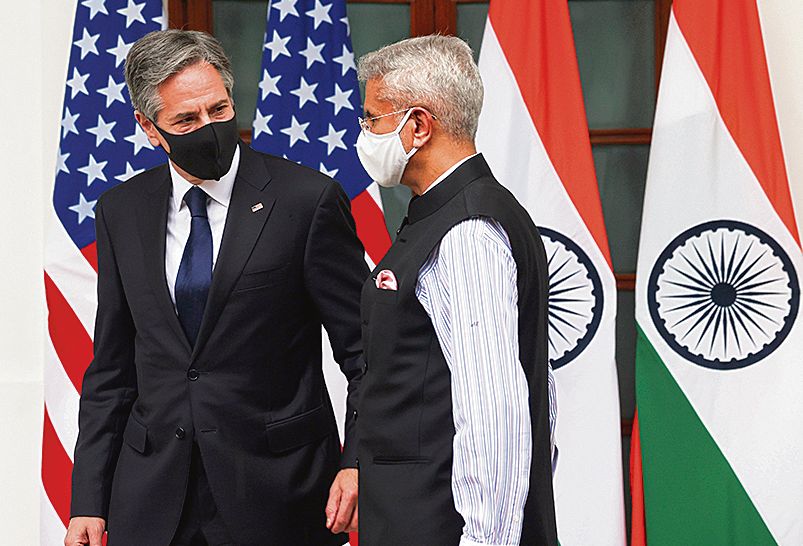US Secretary of State Antony Blinken warns that if the Taliban takes power by force, Afghanistan will become a “pariah state” as a top-level delegation from the armed group visits China to assure officials of their international obligations.
“An Afghanistan that does not respect the rights of its people, an Afghanistan that commits atrocities against its own people would become a pariah state,” Blinken told reporters in India on Wednesday during his first official visit.
Good to meet US Secretary of State @SecBlinken today. I welcome President Biden's strong commitment to strengthen the India-US Strategic Partnership, which is anchored in our shared democratic values and is a force for global good. pic.twitter.com/HlNqKVTM95
— Narendra Modi (@narendramodi) July 28, 2021
The Taliban’s leadership in China promised Beijing that Afghanistan will not be used as a base for planning against another country.
As the organization continues its sweeping assault throughout Afghanistan, including regions near their shared border, a team led by co-founder Mullah Abdul Ghani Baradar is in China for negotiations.
Despite the fact that their border is just 76 kilometers (47 miles) long and located at a mountainous high altitude without a road crossing, Beijing is concerned that Afghanistan might be used as a staging area for Uighur rebels in Xinjiang.
Mohammad Naeem, a Taliban spokesperson, told the AFP news agency that such fears were false.
“The Islamic Emirate assured China that Afghanistan’s soil would not be used against any country’s security … They (China) promised not to interfere in Afghanistan’s affairs but instead help to solve problems and bring peace.”
The focus of the discussions, which were chaired by Chinese Foreign Minister Wang Yi, was confirmed by Beijing.
In Kabul, though, Afghan President Ashraf Ghani asked the international community to
“In terms of scale, scope and timing, we are facing an invasion that is unprecedented in the last 30 years,” he warned in a speech on Wednesday.
“These are not the Taliban of the 20th century … but the manifestation of the nexus between transnational terrorist networks and transnational criminal organizations.”
Blinken told the Taliban in New Delhi that if it sought worldwide recognition, it would have to reform.
“The Taliban says that it seeks international recognition, that it wants international support for Afghanistan. Presumably, it wants its leaders to be able to travel freely in the world, sanctions lifted, etc,” he said.
“The taking over of the country by force and abusing the rights of its people is not the path to achieve those objectives.”
Analysts claim that given its closeness to Muslim-majority Xinjiang, China, whose declared foreign policy stance is non-interference in other countries affairs, is concerned about the Taliban’s religiosity.
However, the gathering lends credibility to a group seeking worldwide recognition – as well as a possible diplomatic shield at the United Nations – to go along with their military march throughout the country.
“Wang Yi pointed out, the Afghan Taliban is a crucial military and political force in Afghanistan,” foreign ministry spokesman Zhao Lijian told reporters in Beijing.
“China has throughout adhered to non-interference in Afghanistan’s internal affairs … Afghanistan belongs to the Afghan people,” he said, in stark contrast to the “failure of US policy towards Afghanistan”.
China to provide ‘diplomatic cover’
Taliban leaders have stepped up their foreign diplomacy in the hopes of gaining world legitimacy when they return to power.
Since May, when US-led foreign troops started their final departure, they have achieved significant gains throughout Afghanistan.
In 2019, Beijing welcomed a Taliban delegation, although the country has previously maintained backdoor ties with the organization via Pakistan.
Although Beijing’s Communist Party and the Taliban have nothing in common ideologically, analysts believe that shared pragmatism will allow mutual self-interest to triumph over sensitive disagreements.
A stable and cooperative government in Kabul will allow Beijing to expand its Belt and Road Initiative into Afghanistan, while the Taliban would see China as a vital source of financial assistance.
“By getting the Chinese on their side, the Chinese would be able to provide them with diplomatic cover at the Security Council,” Australia-based Afghanistan expert Nishank Motwani told AFP.
“It is important to note … when other countries open up their doors and engage with the Taliban it undercuts the legitimacy of the Afghan government and presents the Taliban almost as a government-in-waiting.”
Meanwhile, Moscow announced that it will provide weapons and equipment to Tajikistan’s military in the face of a “deteriorating” situation in Afghanistan, after the Taliban’s recent seizure of a border crossing with the Central Asian country.










